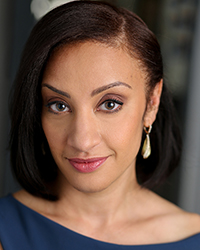
 Kaja Dunn
Kaja Dunn
Theater, College of Arts + Architecture
In an effort to shed some more light on the measures faculty members are taking to assure the online courses they teach this fall align with students’ learning needs and expectations, we reached out to Dunn to see how she is approaching a few of her courses this fall semester.
What steps are you taking to create an effective online learning environment for your students?
The shift to online learning as it relates to theater and acting is providing an emphasis on creating a space where students and professors work together to share knowledge as effectively as possible. I’m planning on framing my classrooms as labs with all of my students as co-conspirators. My students will be engaged with real-world projects like developing strategies for online performance, creating marketing materials and performing actual TV and commercial scripts.
In the online classroom, I’m utilizing things that create a pleasant and joyful environment as well as teach through Bitmoji acting studios, course trailers and warm-ups developed online.
To keep things interesting, I’ve broken courses up using different media tools. I learned how to create animated slideshows in Prezi and am using all sorts of media to cultivate engagement in the classroom.
I’m excited to employ some new teaching strategies such as co-designing assessment rubrics to better align with online performance, offering options of multiple modalities for student feedback and assessment adding video and audio reflections to written assessments.
And I’m heading into the semester planning to acknowledge the challenges aloud through conversations with my students, within my syllabi and periodic check-ins to ensure I’m keeping the emotional stress of my students front of mind.
By creating solutions in response to the challenges of the pandemic and taking a compassionate approach to teaching, I am excited to enter the semester and think there will be positive growth and discovery.
What should students do to be successful in your online classes?
To help students I am simplifying courses to focus on assessing the core skills they need. And I’ve built my courses around that principle. I’m asking students to stay in communication with me and attend class synchronously, so we can engage on a regular basis.
I need students to trust me that I’ve thoroughly planned for this semester just as I trust them to approach the online learning environment with the same passion as a face-to-face classroom.
How are you prepared to navigate the unique landscape of this fall semester?
The field of theater/acting has been great at sharing information for effective online pedagogy and I have participated and spoken at several conferences collaborating with relevant ideas and strategies.
I have small children at home and I learned this spring from watching them navigate their classes, and actually picked up some useful tools from elementary and middle school teachers as well.
And some of the things I learned from my days of touring school shows as an actor have come in handy, especially the notion that if something works to keep the attention of a young kid it usually works for older audiences.
There is definitely an element of performance to all this that I’m familiar with as an actor.
How will you create a sense of classroom community within an online environment?
I have spent my summer talking with large unions and industry leaders as well as other academics to understand what the industry is doing in terms of precautions and safety standards. To that end, I will be virtually bringing in guest artists from nationally recognized theatres and international institutions, casting directors, actors, playwrights and producers to tap into the industry community. There is a space and opportunity for students to meet with leaders in the industry, and the online environment will allow me to more easily bring some of those connections directly to the classroom to speak to students.
This semester also provides an opportunity to look at assumptions, equity, storytelling and innovation within the discipline. Theatre has a long problem with racial and economic injustice. There are so many people who become marginalized.
I began doing online or "Zoom theatre" in March, shortly after the pandemic started. It's hard. However, I got into teaching to explore and discover with students, to experiment and learn together in an inclusive and structured environment, and I look forward to the journey ahead. Theatre is being reformed in the pandemic and a centuries-old art form is being shifted.